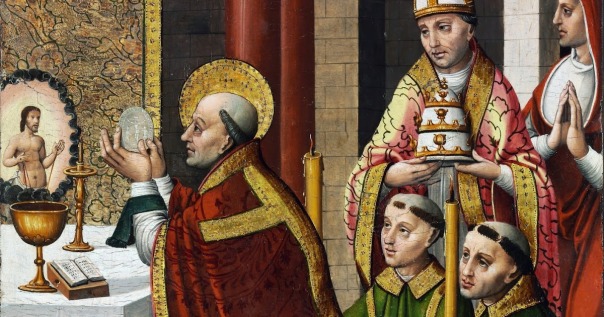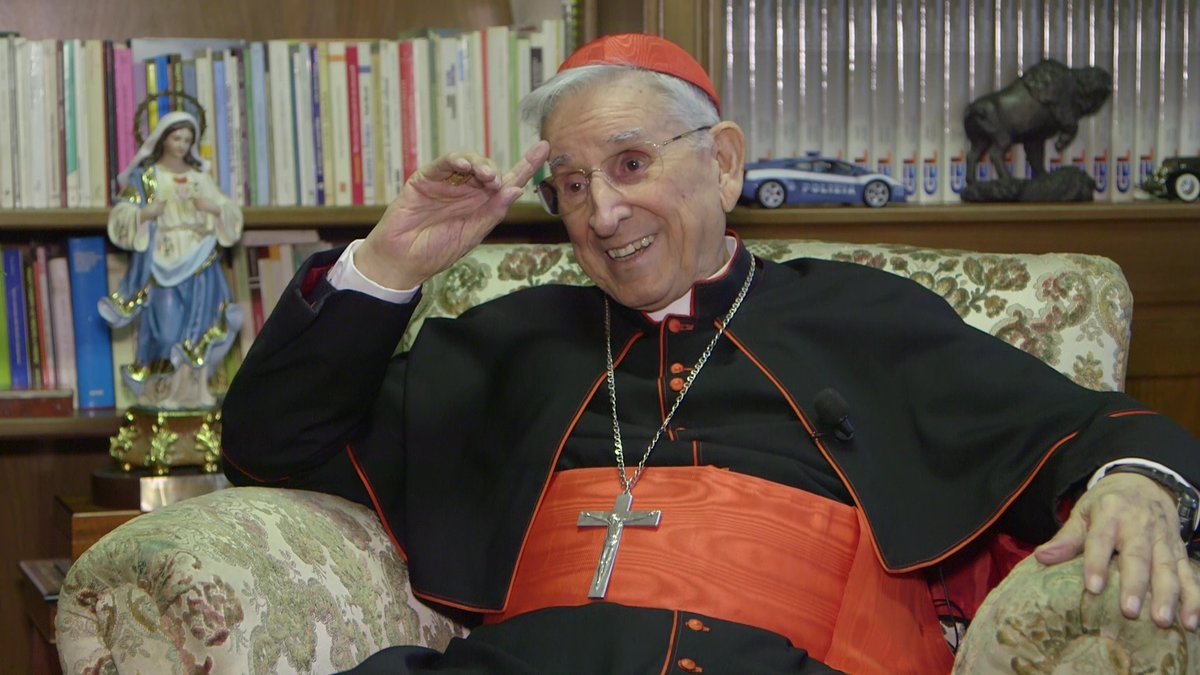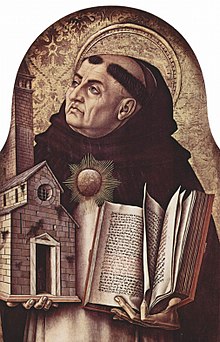 |
| Fr Mark Montebello OP u l-Arċisqof Charles J. Scicluna (Ritratt: Net News) |
F'dawn l-aħħar ġranet reġgħet qamet kontroversja dwar Fr Mark Montebello. Mingħajr ma nidħlu fuq il-mertu ta' din id-diskussjoni, fil-passat dan il-Blog kien diġa' ppubblika
artiklu negattiv minn dan il-patri dwar ir-Rit Tridentin. Illum nerġgħu nagħtu ħarsa lejn kif jaħsibha Montebello dwar dak kollu li għandu x'jaqsam mal-Konċilju ta' Trentu. Dawn l-artikli kienu ppubblikati 3 snin ilu
hawn u
hawn minn Montebello nnifsu.
Spiss għedt (u nerġa’ ngħid għal min irid jisma’) li l-għeruq tal-irrelevanza li l-Knisja Kattolika f’Malta u Għawdex qiegħda ġġarrab dejjem aktar jinsabu fil-faqar tal-viżjoni ekkleżjoloġika u antropoloġika tagħha. Għalkemm dawn huma oqsma duttrinali, jinfluwixxu ħafna fuq l-operat ekkleżjastiku.
Fi ftit kliem, l-antropoloġija tiġbor fi ħdanha t-teoriji dwar x’inhu l-bniedem: x’jagħmlu kuntent; x’inhu li jroddlu sens f’ħajtu; x’pożizzjoni għandu fid-dinja u fil-fasla ekonomika u politika, u ħwejjeġ bħal dawn. L-ekkleżjoloġija tiġbor it-teoriji dwar x’inhi l-Knisja: minn xiex hi magħmula; għalfejn teżisti; lejn xiex trid twassal il-ħidma tagħha, u ħwejjeġ bħal dawn.
Għalkemm iż-żewġ oqsma huma distinti minn xulxin, huma mhux biss relatati mill-qrib, imma ħafna mit-tieni qasam jiddependi fuq dak li jinħaseb fl-ewwel wieħed. Hawnhekk, illum, se nitħaddet biss dwar it-tieni qasam f’rabta mal-Knisja lokali. Darba oħra, nitħaddet dwar il-qasam l-ieħor.
Ekkleżjoloġija Tridentina
Nibda biex insostni b’konvinzjoni informata li l-ekkleżjoloġija li jħaddnu l-biċċa l-kbira tal-Kattoliċi Maltin u Għawdxin (pastoralment attivi u mhux; kjeriċi u lajċi) hija Tridentina. Dan ifisser li l-kunċett bażiku tagħhom ta’ x’inhi l-Knisja huwa dak imnebbaħ mill-Konċilju ta’ Trentu (tas-seklu 16). Mhuwiex, għandi nżid, kunċett imnebbaħ, kif għandu jkun, mill-Konċilju Vatikan II (seklu 20).
Dan il-kunċett Tridentin jistħajjel Knisja li hija armata f’taqbida mqaddsa b’armi spiritwali daqskemm materjali; armata li hi soċjetà magħluqa mikduda bil-ħsieb tal-fruntieri; armata b’regoli fissi, imfassla f’għamla piramidika, b’ideoloġija monolotika u b’perspettiva operattiva ta’ ‘aħna’ u ‘huma’. Hija Knisja b’filosofija ta’ esklussività.
F’kuntrast, l-ekkleżjoloġija tal-Konċilju Vatikan II tistħajjel Knisja li hija poplu f’mixja; poplu li qiegħed dejjem jitgħallem u jikber spiritwalment daqskemm umanament; poplu fi ħbiberija ma’ kull sinjal ta’ tjieba u grazzja; poplu ta’ ħbieb u msieħba, b’ideoloġija diversifikata u b’perspettiva operattiva ta’ kooperazzjoni u għajnuna mutwa. Hija Knisja b’filosofija ta’ inklużjoni.
Il-faqar ekkleżjoloġiku
Qrajt għal darba oħra dan l-aħħar (u nisma’ spiss lil min jirrepetiha, ukoll nies bravi, biex ma nsemmix bosta soċerdoti) li l-Knisja hi għamla ta’ partit politiku. Xi wħud jaslu biex jgħidu li hi għamla ta’ trajdunjin, klabb tal-futbol jew saħansitra każin tal-banda. Dawn huma eżempji tajba tal-ekkleżjoloġija Tridentina u tal-faqar ekkleżjoloġiku.
Iżda l-punt ewlieni tiegħi hawnhekk mhuwiex x’ekkleżjoloġija jistħajlu dawn in-nies, daqskemm l-anakroniżmu tagħhom. U l-inkwiet veru jibda meta tqis kemm Kattoliċi (u mhux) f’Malta u Għawdex iħaddnu din l-ekkleżjoloġija. L-inkwiet ikompli meta wieħed iqis li l-mexxejja klerikali nfushom għandhom jippropagaw sallum din is-sura ta’ ekkleżjoloġija, jekk mhux espliċitament fit-teorija għallanqas impliċitament fil-prattika.
Għal dawn in-nies kollha—li, nissusspetta b’sogħba, isawru l-biċċa l-kbira tal-Kattoliċi Maltin u Għawdxin—il-Konċilju Vatikan II seta’ ma sar xejn. Tridentini kienu u Tridentini għadhom. Biex jilmaħ dan, biżżejjed wieħed jagħti titwila mqar ħafifa lejn it-teoloġija (rudimentali) li jgħallem il-kleru, l-istil (paternalistiku) ta’ ħidma parrokkjali, is-sura (barokka) tal-liturġija u sa l-arti (trijonfalistika) fil-knejjes. Malajr jintebaħ li l-135,000 kelma ta’ Vatikan II kienu bżieq moħli.
Abbandun meħtieġ
Il-punt prattiku hu dan: qabel ma l-Knisja Kattolika fil-gżejjer Maltin tabbanduna l-apparat katidratiku tal-ekkleżjoloġija Tridentina li tħaddan kurrentement ma tista’ qatt tkun ferħ u tama, omm u għalliema, jew dawl fid-dinja tallum. Hija ineżorabbilment ikkundannata għall-irrelevanza u, fl-aħħar mill-aħħar, għall-estinzjoni relattiva.
Knisja Kattolika Tridentina ma tistax tissopravivi fid-dinja tallum. Naf perfettament li hu mill-aktar diffiċli li l-ekkleżjoloġija tal-Konċilju Vatikan II tiġi tradotta fi strutturi u fasliet relattivi konkreti. Iżda dan ikun impossibbli mingħajr ir-rieda ‘politika’ (jew amministrattiva) serja u konvinċenti sabiex jibda jseħħ. Minkejja l-paroli li jsir, din ir-rieda sempliċiment ma narahiex.
Nifhem li l-kankru ta’ ekkleżjoloġija fqira mhuwiex faċli li timmansah jew tasal biex ixxejnu. Huwa kankru mifrux f’kull fibra tal-ġisem. Biex jibda jċedi jeħtieġ kirugi qalbiena daqskemm għorrief u għaqlija, b’idejn sodi u b’determinazzjoni tal-ħadid.
Il-ħsad huwa kbir, iżda l-ħaddiema dgħajfa.
Antropoloġija Ifqar
Fi żmienna, ekkleżjoloġija maħsuba b’fasla mentali legalista (Tridentina) hi anakronista daqs maħsuba b’fasla oġġettivista, jiġifieri bħala oġġett, aktar milli suġġett. Ekkleżjoloġija bħal din dak li tagħmel: tqis lill-bniedem bħala oġġett ta’ liġijiet stabbiliti u duttrini immutabbli, u ma tevalwax biżżejjed is-siwi ta’ kull bniedem fih innifsu. Dan jintwera f’diversi deċiżjonijiet ta’ natura proċedurali, etika u morali li jittieħdu minn min iħaddanha.
Antropoloġija suġġettivistika
Antropoloġija suġġettivistika (jew personalistika, jekk trid) hija dik żviluppata filosofikament u teoloġikament wara r-riflessjonijiet ta’ Immanuel Kant (fis-seklu 18). Flimkien ma’ dak spiritwali, (ontoloġikament) hija tagħti siwi qawwi lill-qasam materjali tal-bniedem. Twieżnu mhux sempliċiment bħala duwalità (ta’ ġisem u ruħ), imma fit-totalità tiegħu (b’mod sħiħ jew ħolistiku).
Hija antropoloġija li (mil-lat soċjoloġiku) ma tqisx lill-bnedmin sempliċiment bħala għamliet differenti ta’ forma waħda, b’mod xi ftit jew wisq sterjotipiku. Kull bniedem, bħala suġġett individwali, hu uniku u irrepetibbli; għandu l-kwalitajiet distinti u speċifiċi tiegħu; jistħoqqlu attenzjoni singula u separata. F’dan is-sens, is-soċjetà—kull soċjetà, inkluż il-Knisja—mhijiex primarjament kollettività daqskemm unità ta’ individwi.
Antropoloġija suġġettivistika ma tqis lill-bniedem bħala l-quċċata tal-ħolqien u, għaldaqstant, sid tal-ħolqien (inkluż tal-annimali l-oħra u tal-ambjent naturali). Tqisu, pjuttost, bħala parti mill-ħolqien; bħala ħlieqa li, bħall-ferħ tagħha (u fi sħubija mal-pjan divin), trid tgħix f’armonija mal-ħolqien f’rispett sħiħ mal-fasla naturali.
Il-preżenza tal-grazzja
Mil-lat politiku, din l-antropoloġija suġġettivistika ma tqis lill-bniedem bħala riċevitur tal-ħidma tal-istituzzjonijiet, imma, pjuttost, bħala parteċipant primarju fihom. Fi kliem differenti, minn dan il-lat il-bniedem mhuwiex oġġett li jobdi u jsegwi, imma suġġett li jikkontribwixxi u joħloq.
Fl-aspett spiritwali tagħha, antropoloġija bħal din ma tistħajjilx ferq nett bejn ir-reliġjuż u s-sekulari; bejn is-sagru u l-profan. B’applikazzjoni tat-twemmin (nisrani) tal-Inkarnazzjoni divina, hija tilmaħ għaqda sħiħa bejn it-tnejn. Xejn ma hu irreliġjuż, għajr id-dnub, u xejn ma hu sagru biss. Is-sagru hu sekulari, u s-sekulari sagru.
Dan jgħodd għal kull aspett tal-ħajja naturali u, partikularment, għall-ħajja umana, inkluż l-imħabba, ir-relazzjonijiet inter-personali u inter-suġġettivistiċi, ix-xogħol manwali, il-ħidma pubblika u l-bqija. Tradotta teoloġikament, din timplika li l-grazzja divina mhijiex xi ħaġa tar-ruħ biss, imma wkoll tal-ġisem; mhijiex marbuta ma’ dak li hu reliġjuż jew spiritwali biss, imma wkoll ma’ kull ħidma u sentiment uman.
Rieda għat-tiġdid
Antropoloġija oġġettivistika li tirriżulta minn kunċett ekkleżjoloġiku Tridentin ma tistax twieżen biżżejjed, la l-ekonomija tas-salvazzjoni (għax tirrendiha għal proċess sempliċiment legalistiku u mekkaniku), u lanqas is-siwi tal-esperjenza rikka umana fil-varjetà kollha tagħha. Għaldaqstant, tiċħad li tirrikonoxxi l-preżenza tal-grazzja divina f’oqsma li hi tqis purament sekulari jew profani.
B’hekk issir aktar arma ta’ esklużjoni milli għodda ta’ inklużjoni u parteċipazzjoni, bħalma, proprjament, għandha tkun il-Knisja f’xebh ma’ Ġesù, ir-ras u l-ġisem tagħha. Issir aktar arma ta’ firda u ta’ telfien milli għodda ta’ unifikazzjoni u ta’ redenzjoni.
Biex nagħlaq dan li fissirt fi ftit kliem ta’ malajr, jekk il-Knisja fil-gżejjer Maltin tista’ xi darba tkun f’pożizzjoni li ġġedded lilha nnifisha, jeħteġilha—bil-grazzja ta’ Alla u bir-rieda ta’ min imexxiha—tieħu l-inkarigu impellattiv li tirrevedi serjament u profondament l-ekkleżjoloġija u l-antropoloġija li tħaddan (l-ewwel nett fil-kleru tagħha).
Jekk dan ma jsirx, tkun qed tagħmilha prattikment impossibbli għaliha nnifisha li timxi mal-pass tad-dinja moderna. Mhijiex, għaldaqstant, kwestjoni li tibdel xi duttrina tagħha—xejn minn dan—imma li tevalwa l-istess duttrina b’mod ieħor, f’sinkronija mal-ħsieb u l-esperjenza tal-bniedem tallum.

 Pro Tridentina (Malta) looks forward to co-operate in this laudable initiative.
Pro Tridentina (Malta) looks forward to co-operate in this laudable initiative.











.bmp)



